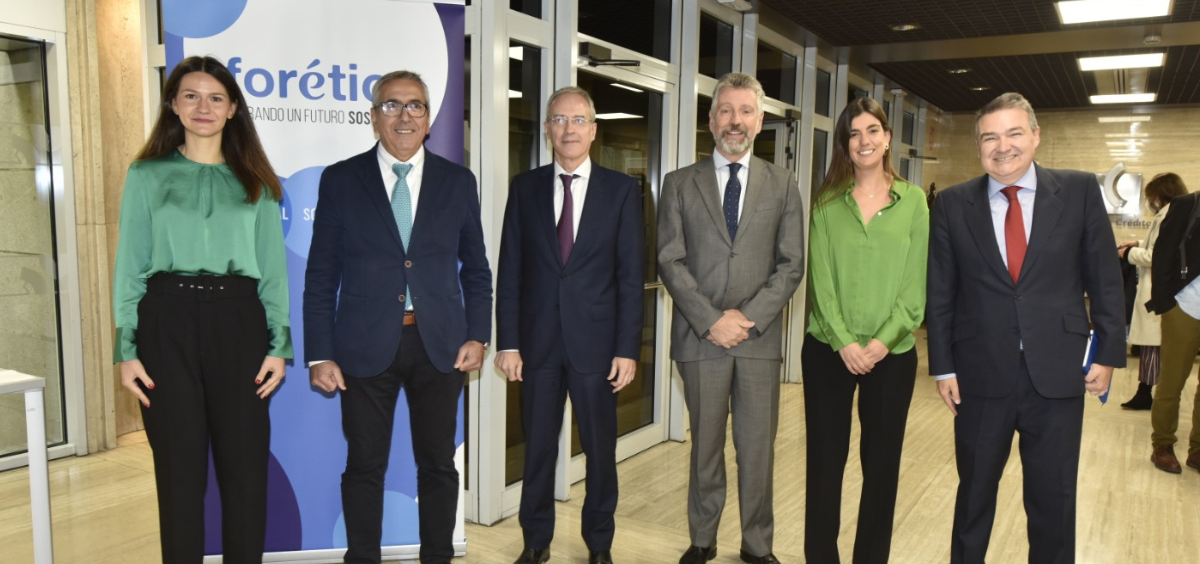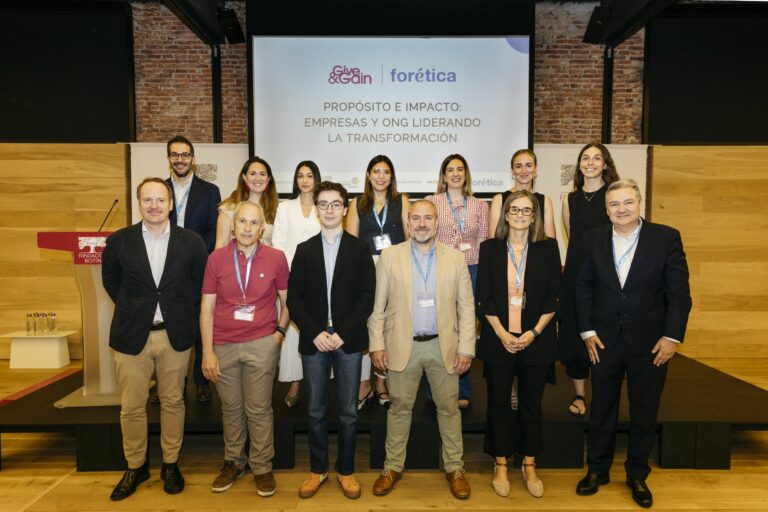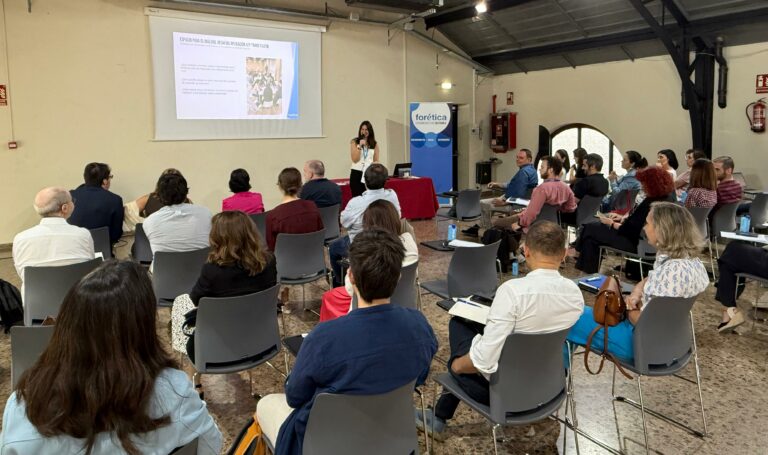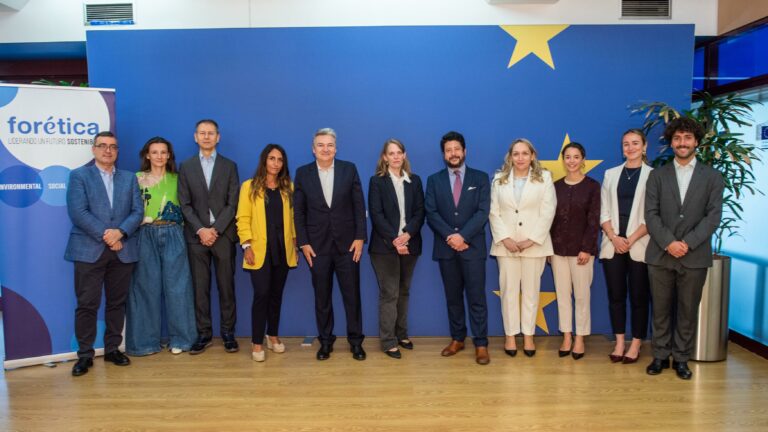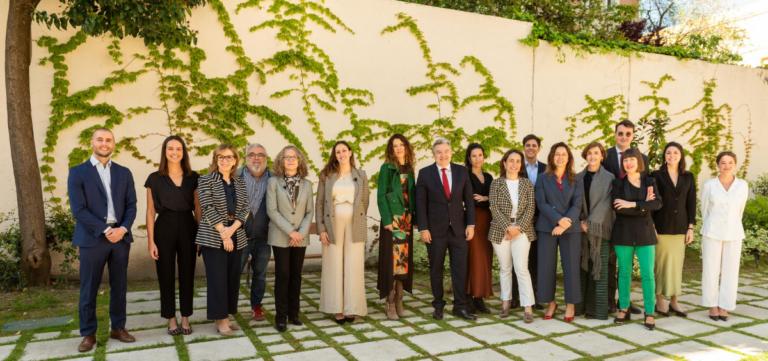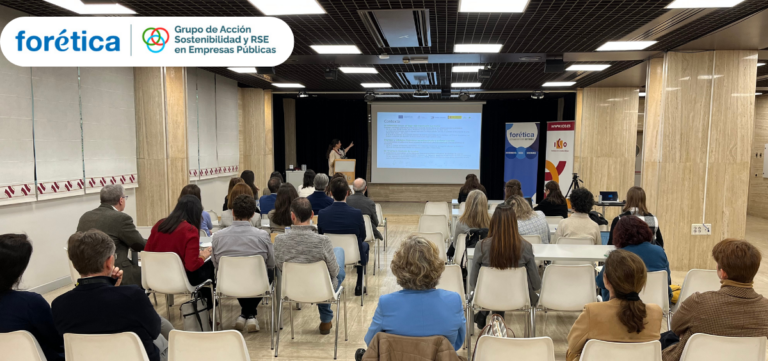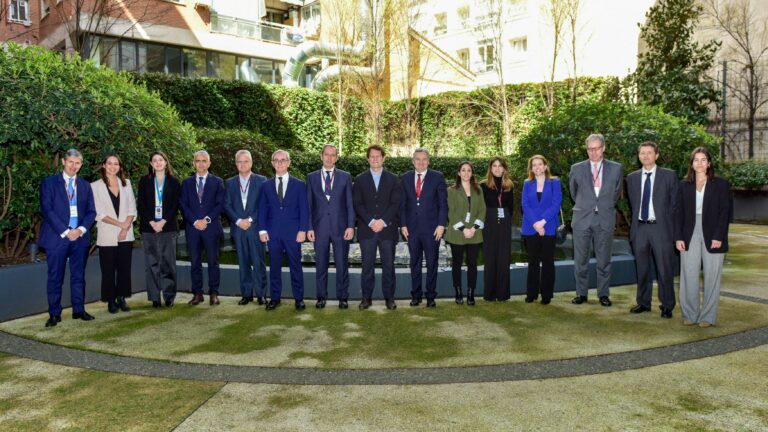- Forética ha presentado el informe ‘Clima y bienestar: En el foco de la agenda ESG de las empresas públicas españolas’, elaborado en el marco del Grupo de Acción de Sostenibilidad y RSE en las Empresas Públicas, liderado por Forética y compuesto por más de 30 entidades públicas
- El informe destaca que el 80% de las empresas públicas miembro del Grupo de Acción cuentan con una estrategia climática con acciones de descarbonización y el 89% implementa medidas para garantizar y fomentar la flexibilidad laboral y la conciliación, entre otros datos
Forética ha organizado una nueva edición del ‘Foro Español de Empresas Públicas por la Sostenibilidad’, en el que se ha presentado el informe ‘Clima y bienestar: En el foco de la agenda ESG de las empresas públicas españolas’. El estudio analiza las principales acciones para contribuir al objetivo de la neutralidad climática para 2050 e identifica las diferentes propuestas para la mejora del cuidado de la salud y bienestar de los empleados en las empresas públicas en España, contribuyendo así a generar un impacto social positivo en la sociedad y el entorno.
Este foro, coincidiendo con el arranque de la Cumbre de Naciones Unidas sobre Cambio Climático (COP27) que se está celebrando en Egipto, se ha organizado en el marco del ‘Grupo de Acción de Sostenibilidad y RSE en las Empresas Públicas’, liderado por Forética y compuesto por 31 entidades miembro, encabezadas por el Instituto de Crédito Oficial (ICO) e Informa D&B.
Los impactos del cambio climático y el cuidado de la salud y el bienestar de las personas son dos de los principales asuntos que ocupan las agendas de gobiernos, empresas y otros actores de la sociedad civil en la actualidad. La aprobación de la Ley de Cambio Climático y Transición Energética, la publicación del Plan Nacional Integrado de Energía y Clima 2021-2030 y del Plan Nacional de Adaptación al Cambio Climático (PNACC) 2021-2030, así como la aprobación de la Estrategia de Descarbonización a Largo Plazo (ELP 2050), marcan la senda para alcanzar la neutralidad climática a 2050 en España.
Además, en los últimos años se observa una apuesta clara por promover la salud y el bienestar de los empleados dentro de la agenda de sostenibilidad empresarial, pasando a ser un tema estratégico dentro de la misma. Así, en el ámbito nacional, el Ministerio de Sanidad aprobaba en diciembre de 2021 la Estrategia en Salud Mental del Sistema Nacional de Salud Periodo 2022-2026 y el Plan de Acción en Salud Mental 2022- 2024, así como el Plan Estratégico de Salud y Medioambiente 2022-2026.
“Por todo ello, las empresas públicas -como vertebradoras del tejido económico y contribuyentes al logro de los Objetivos de Desarrollo Sostenible (ODS)- tienen un papel estratégico en la transición hacia una economía más sostenible y, por tanto, están prestando atención a las acciones de adaptación y de descarbonización de la economía para la carrera hacia el ‘Net Zero’ de 2050 y hacia el cuidado de la salud y el bienestar de sus trabajadores”, afirma Germán Granda, Director General de Forética.
El informe ‘Clima y bienestar: En el foco de la agenda ESG de las empresas públicas españolas’ publicado por Forética en el marco del ‘Grupo de Acción de Sostenibilidad y RSE en las Empresas Públicas’, destaca que casi el 80% de las empresas públicas miembro del Grupo de Acción cuentan con una estrategia climática con acciones de descarbonización (medidas de eficiencia energética, electrificación, producción y consumo de energías renovables, entre otras) y para casi el 70% de las empresas públicas descarbonizar la cadena de suministro es una de claves para lograr las cero emisiones netas en sus organizaciones.
En materia de salud y bienestar, el documento destaca que el 81% de las empresas públicas del Grupo de Acción cuentan con una estrategia o un programa específico para el cuidado de la salud y el bienestar de sus equipos, un asunto que cada vez cobra mayor relevancia en la agenda de las empresas públicas. Entre las iniciativas orientadas a asegurar y promover la salud y bienestar entre los equipos de las empresas públicas del Grupo de Acción, el 89% implementa medidas para garantizar y fomentar la flexibilidad laboral y la conciliación, el 85% lleva a cabo acciones para la promoción de un estilo de vida y hábitos saludables, el 44% promueve acciones para garantizar la desconexión digital y el 26% ofrece medidas de apoyo psicológico y emocional a los trabajadores.
La acción de las empresas públicas ante los retos globales en sostenibilidad
Ana Gómez, Manager del Grupo de Acción de Sostenibilidad y RSE en las Empresas Públicas, destaca: “De acuerdo con el primer test de estrés climático realizado por el Banco Central Europeo, España es un país especialmente vulnerable a los efectos del cambio climático, presentando 12 veces más riesgo físico que la media de los países de la Eurozona. En respuesta a este reto, con la aprobación de la Ley de Cambio Climático y Transición Energética el sector público, por primera vez, se establece y se posiciona como un agente de cambio activo en las políticas de inversión y el sector empresarial se asienta igualmente como un agente de cambio de primer orden para acompañar toda esta transformación alineada con los objetivos del Acuerdo de París”.
En palabras de María Ordovás, Responsable del Grupo de Acción de Sostenibilidad y RSE en las Empresas Públicas: “Durante los dos últimos años se ha producido un deterioro de la salud mental en España y en la población global, con un aumento de los casos de ansiedad, depresión, soledad o estrés a nivel global. Dado el gran poder de actuación y el fuerte impacto que las organizaciones ejercen sobre las personas, deben trabajar por articular medidas inclusivas, respetuosas y ambiciosas que favorezcan la salud y el bienestar, una de las nueve rutas de transformación empresarial incluidas en la hoja de ruta ‘Visión 2050’ presentada recientemente en el marco del Consejo Empresarial Español para el Desarrollo Sostenible”.
La quinta edición del ‘Foro Español de Empresas Públicas por la Sostenibilidad’ ha sido inaugurado por el Secretario de Estado de Hacienda del Ministerio de Hacienda y Función Pública, Jesús Gascón; el Presidente del ICO, José Carlos García de Quevedo; y el Presidente de Informa D&B y de Cesce, Fernando Salazar.
Se han podido escuchar experiencias de alto impacto por parte de diferentes entidades públicas miembro del Grupo de Acción de Sostenibilidad y RSE en las Empresas Públicas: Silvia Fernández de Caleya Álvarez, Jefa de Recursos Humanos y Responsabilidad Social Empresarial del ICO; Adelaida Rodríguez Baquero, Subdirectora de Coordinación y Auditoría Legal del ICEX; María José Ruiz Olmedo, Responsable de RSC y Comunicación Interna de Informa D&B; Raúl Martín Fontana, Especialista en Medio Ambiente de SENASA; y Pilar Blaya Hernández, Directora de RSC y Capital Humano de Valenciaport.
Esta visión empresarial ha sido complementada con la perspectiva desde la administración pública por parte de Miguel González-Sama Puga, Coordinador del Área de Dirección del Instituto Nacional de Seguridad y Salud en el Trabajo (INSST) del Ministerio de Trabajo y Economía Social.
El Grupo de Acción de Sostenibilidad y RSE en las Empresas Públicas, liderado por Forética y encabezado por el Instituto de Crédito Oficial (ICO) e Informa D&B, está compuesto por más de 30 entidades públicas miembro: Adif, Aena, Aquavall, Cesce, Corporación Empresarial Pública de Aragón, Emasesa, ENAIRE, Enresa, ENUSA, Extremadura Avante, Grupo Tragsa, ICEX, INECO, Metro de Madrid, Navantia, Paradores, Renfe, RTVE, SENASA y Valenciaport. En el Grupo participan en calidad de miembros observadores las siguientes entidades: COFIDES, Corporación Pública Empresarial de Navarra (CPEN), Giahsa, la Guardia Civil, ISDEFE, la Dirección General de la Policía, Red Elige, la Red Nacional de RSC y Sociedad Mercantil Estatal de Gestión Inmobiliaria de Patrimonio (SEGIPSA).
En el marco de la quinta edición del Grupo de Acción en 2022, se han organizado sesiones de trabajo para analizar la acción de las empresas públicas en la transición hacia las cero emisiones netas y en materia de salud y bienestar. El Grupo ha abordado en ediciones previas asuntos claves en materia de sostenibilidad como son el compromiso de las empresas públicas con los nuevos marcos regulatorios de sostenibilidad de la Unión Europea, la contribución a la Agenda 2030 (con foco en las iniciativas vinculadas a transparencia, economía circular y voluntariado corporativo), la gestión de riesgos no financieros o la contratación pública responsable, entre otros.

